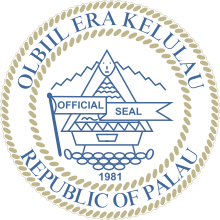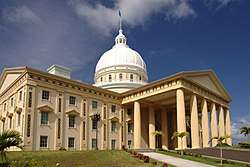Politics of Palau
 |
|---|
| This article is part of a series on the politics and government of Palau |
|
Politics of Palau takes place in a framework of a presidential representative democratic republic, where by the President of Palau is both head of state and head of government, and Palau currently has no political parties. It is a de facto non-partisan democracy since no law prevents the formation of political parties. Executive power is exercised by the government. Legislative power is vested in both the government and the Palau National Congress. The Judiciary is independent of the executive and the legislature.
Executive branch
Presidential elections take place every four years, when the president and vice president run on separate tickets. The president, who is the head of state and head of government, is currently Thomas Remengesau Jr..

Legislative branch
The Palau National Congress (Olbiil era Kelulau) consists of two chambers - the Senate and the House of Delegates. The Senate currently has 13 members elected nationwide. The House has 16 members, one from each of Palau's states. All legislators serve 4-year terms. Each state also elects its own governor and legislature.
The Council of Chiefs advises the president on traditional laws and customs. It is made up of the highest traditional chiefs from each state. Yutaka Gibbons (of Koror) is Chairman of the Council of Chiefs.
Political parties and elections
| Members | House of Delegates | Senate |
|---|---|---|
| Non-partisans | 16 | 13 |
| Total | 16 | 13 |
Judicial branch
The judicial system consists of the Supreme Court, National Court, the Court of Common Pleas, and the Land Court. The Supreme Court has trial and appellate divisions and is presided over by the Chief Justice of Palau.
Political history
Palau adopted a constitution on January 1, 1981.[1]
While calm in recent years, Palau witnessed several instances of political violence in the 1980s. The republic's first president, Haruo I. Remeliik, was assassinated in 1985; the Minister of State was found to be complicit in the crime. Palau's third president, Lazarus Salii, committed suicide in August 1988 amid bribery allegations. Salii's personal assistant had been imprisoned several months earlier after being convicted of firing shots into the home of the Speaker of the House of Delegates.
Palau gained independence from the United Nations trusteeship administered by the United States on 1 October 1994 and entered a Compact of Free Association with the United States.
The Senate passed legislation making Palau an "offshore" financial center in 1998. Opponents to the legislation voiced fears that the country would become a haven for money launderers and other sorts of criminal activity. In December 1999, a group of major international banks banned U.S. dollar-denominated transactions involving Palau and the other Pacific island states of Vanuatu and Nauru.[2]
References
- ↑ Patterson, Carolyn Bennett, et al. "At the Birth of Nations: In the Far Pacific." National Geographic Magazine, October 1986 page 493. National Geographic Virtual Library, Accessed 17 May 2018. "The westernmost among the emerging nations of the Pacific, the Republic of Palau (or Belau), population more than 15,000, is divided into 16 separate states, each with its own governor, lieutenant governor, and legislature. Most state populations are very small, and one wonders if anyone has time for anything but government, American style and democratic though it may be. An example is Peleliu, the tragic island where more than 13,000 Americans and Japanese died during less than three months of fighting, often hand to hand, in the autumn of 1944. Pat and I went to Peleliu from Koror, the republic's capital, by speedboat, a wave-tossing, rear-slapping 45 minutes, and arrived to discover it was election day, with five candidates running for governor. Although Peleliu claims a population of 2,000 people, only 400 actually live there. More registered voters live in Koror than on their home island, and 800 send votes from Guam. The situation is similar in Palau's other states. A current joke puts a laugh in the truth. A man walks into a bar in Koror and calls out, "Hey, Governor!" And half the men in the place stand up. But that's only the state story. The national government is headed by President Lazarus Salii, followed by a vice president, a cabinet responsible for five ministries, a judiciary, and a legislature with a 16-member house and a 14-member senate. Then there's the hereditary leadership. Each village has ten chiefs, ranked in importance. And, dividing the island group, there are two paramount chiefs. Never, I thought, have so few been governed by so many."
- ↑ Field, Michael (December 21, 1999). "World Banks Isolate Three Pacific Countries: Nauru, Palau and Vanuatu Accused of Money Laundering". Pacific Islands Report. Agence France-Presse. Retrieved February 1, 2016.